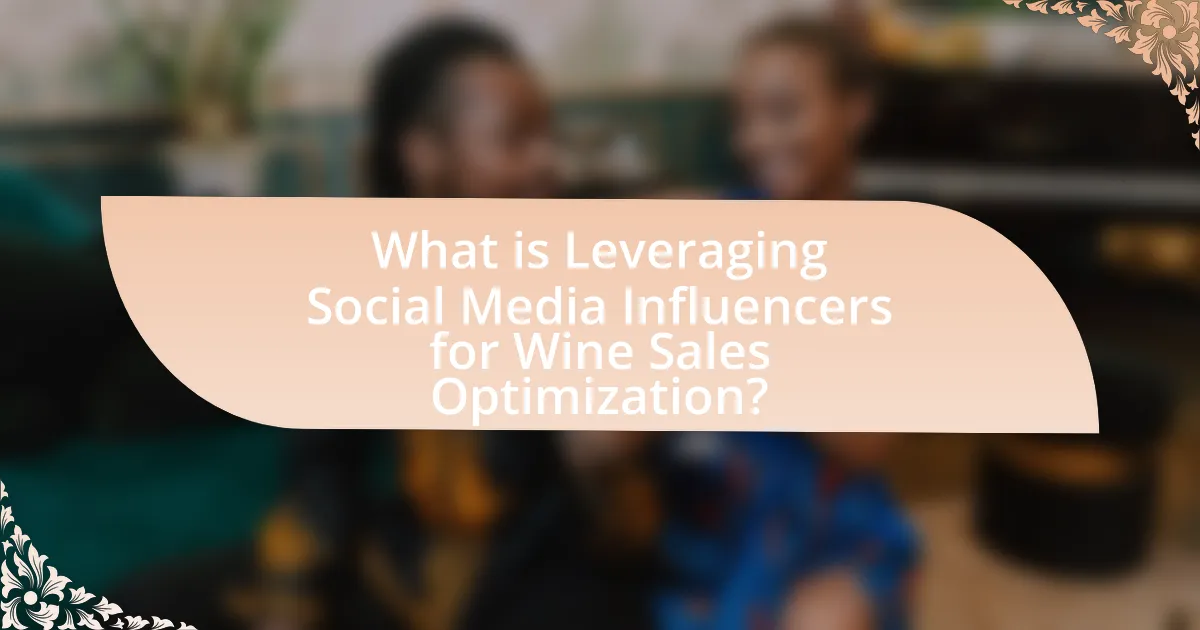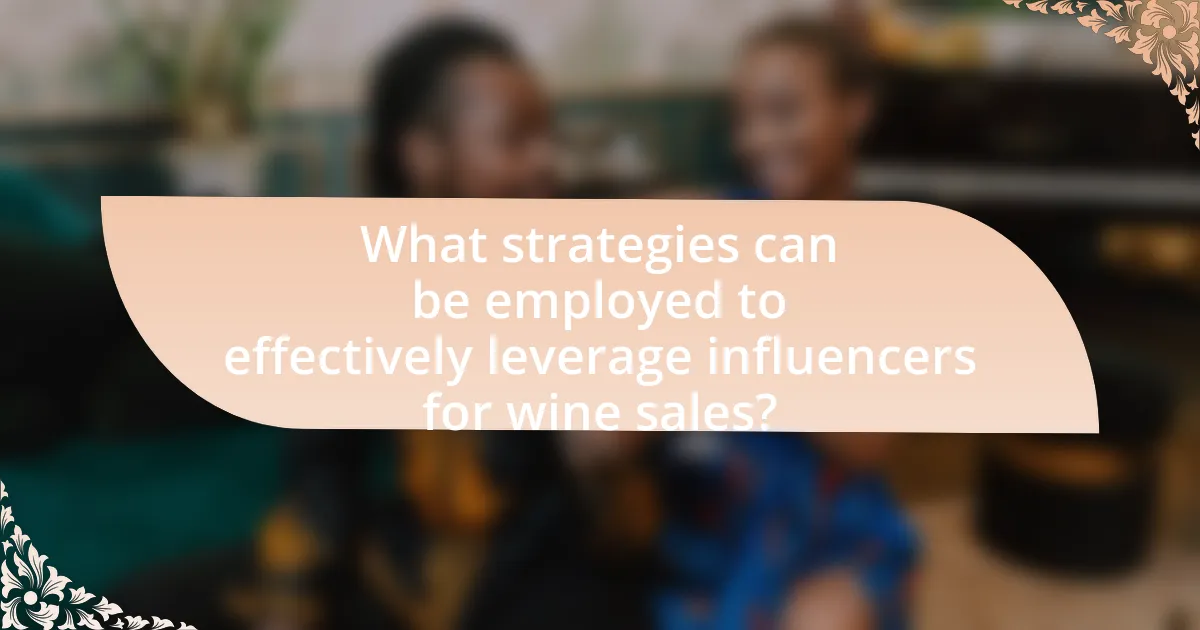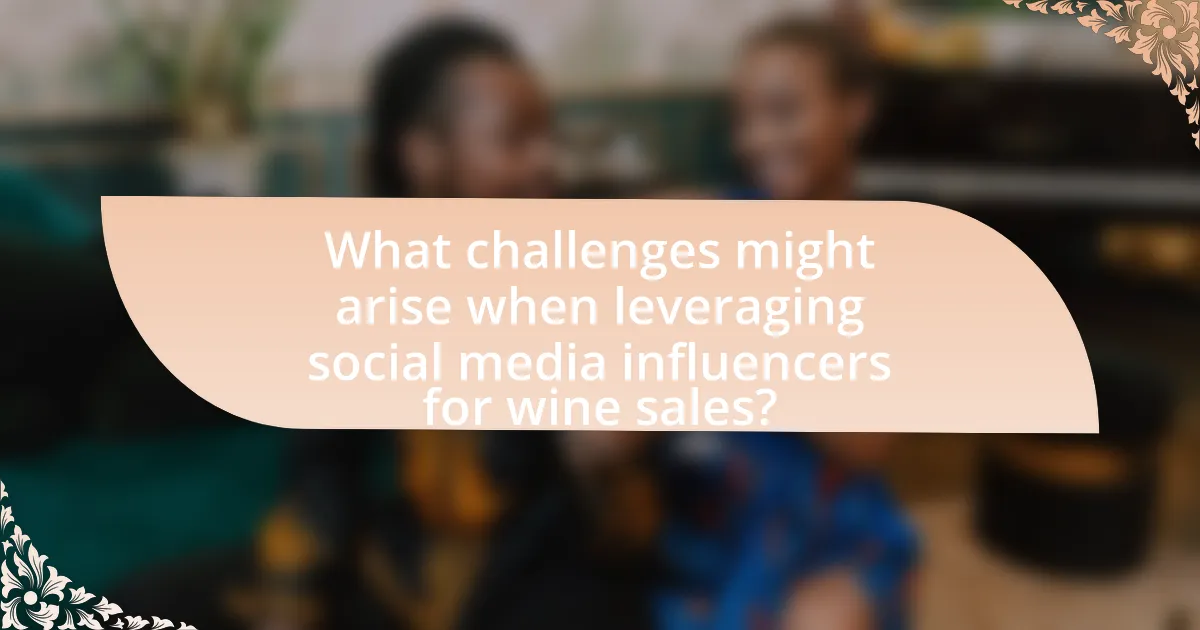Leveraging social media influencers for wine sales optimization involves utilizing individuals with substantial online followings to enhance brand visibility and drive sales. The article explores the significant impact influencers have on consumer decision-making, highlighting that 49% of consumers rely on their recommendations when purchasing wine. It contrasts influencer marketing with traditional advertising, emphasizing the authenticity and engagement that influencers provide. Additionally, the article outlines strategies for selecting the right influencers, creating effective content, and measuring campaign success, while addressing potential challenges and best practices for maintaining successful partnerships in the wine industry.

What is Leveraging Social Media Influencers for Wine Sales Optimization?
Leveraging social media influencers for wine sales optimization involves utilizing individuals with significant online followings to promote wine brands and products, thereby increasing visibility and sales. Influencers can create authentic content that resonates with their audience, leading to higher engagement rates and trust in the brand. According to a study by the Digital Marketing Institute, 49% of consumers depend on influencer recommendations when making purchase decisions, highlighting the effectiveness of this strategy in driving sales.
How do social media influencers impact wine sales?
Social media influencers significantly impact wine sales by leveraging their large followings to promote specific brands and products. Their endorsements can lead to increased visibility and credibility for wine brands, resulting in higher consumer interest and purchase rates. For instance, a study by the University of Southern California found that influencer marketing can yield an ROI of up to 11 times the initial investment, demonstrating the effectiveness of influencers in driving sales. Additionally, influencers often create engaging content that resonates with their audience, making wine more appealing and accessible, which further boosts sales.
What role do influencers play in consumer decision-making for wine purchases?
Influencers significantly impact consumer decision-making for wine purchases by shaping perceptions and preferences through their recommendations. Their authority and reach on social media platforms enable them to create trends and drive engagement, leading consumers to trust their opinions over traditional advertising. Research indicates that 49% of consumers rely on influencer recommendations when making purchase decisions, highlighting the effectiveness of influencers in guiding choices in the wine market. Additionally, influencers often share personal experiences and detailed reviews, which can enhance consumer confidence and encourage trial of specific wine brands or varieties.
How does influencer marketing differ from traditional marketing in the wine industry?
Influencer marketing in the wine industry differs from traditional marketing primarily in its reliance on personal connections and social media engagement rather than broad advertising channels. Influencer marketing leverages the credibility and reach of individuals who have established trust with their audience, allowing for targeted promotions that resonate more authentically with consumers. In contrast, traditional marketing often utilizes mass media, such as television and print ads, which may lack the personal touch and direct interaction that influencers provide. Research indicates that 49% of consumers depend on influencer recommendations when making purchase decisions, highlighting the effectiveness of this approach compared to traditional methods that may not engage consumers on a personal level.
Why is it important to leverage social media influencers in the wine market?
Leveraging social media influencers in the wine market is important because they significantly enhance brand visibility and consumer trust. Influencers have established audiences that trust their recommendations, which can lead to increased engagement and sales for wine brands. According to a study by Nielsen, 92% of consumers trust recommendations from individuals over brands, highlighting the effectiveness of influencer marketing. Additionally, social media platforms allow for targeted marketing, enabling wine brands to reach specific demographics that align with their products, thereby optimizing sales potential.
What trends in consumer behavior support the use of influencers for wine sales?
The trend of increased reliance on social media for purchasing decisions supports the use of influencers for wine sales. Research indicates that 49% of consumers depend on influencer recommendations when making purchase choices, particularly in lifestyle sectors like wine. Additionally, the rise of younger consumers, especially Millennials and Gen Z, who prioritize authenticity and peer recommendations, further drives this trend. These demographics are more likely to engage with brands promoted by influencers they trust, leading to higher conversion rates. Furthermore, the visual nature of platforms like Instagram aligns well with wine marketing, as appealing imagery can significantly influence consumer interest and purchasing behavior.
How can influencers enhance brand visibility and engagement for wine brands?
Influencers can enhance brand visibility and engagement for wine brands by leveraging their established audiences and creating authentic content that resonates with consumers. By showcasing wine products through visually appealing posts, tastings, and storytelling, influencers can effectively reach targeted demographics, increasing brand awareness. For instance, a study by the Digital Marketing Institute found that 49% of consumers depend on influencer recommendations when making purchase decisions. This demonstrates the significant impact influencers have on consumer behavior, particularly in niche markets like wine.

What strategies can be employed to effectively leverage influencers for wine sales?
To effectively leverage influencers for wine sales, brands should focus on strategic partnerships, authentic storytelling, and targeted campaigns. Strategic partnerships involve selecting influencers whose audience aligns with the brand’s target demographic, ensuring that the influencer’s followers are likely to be interested in wine products. Authentic storytelling allows influencers to share personal experiences with the wine, creating a genuine connection that resonates with their audience. Targeted campaigns can include exclusive promotions or events that encourage followers to engage with the brand, driving sales. Research indicates that influencer marketing can yield an ROI of up to $6.50 for every dollar spent, highlighting its effectiveness in driving sales when executed properly.
How can wine brands identify the right influencers to partner with?
Wine brands can identify the right influencers to partner with by analyzing their audience demographics, engagement rates, and content relevance. Brands should focus on influencers whose followers align with their target market, ensuring that the influencer’s audience is interested in wine-related content. Additionally, evaluating engagement rates provides insight into how effectively the influencer connects with their audience, which is crucial for driving sales. Research indicates that influencers with a higher engagement rate, typically above 3%, can lead to better conversion rates for brands. Furthermore, assessing the influencer’s previous collaborations and the authenticity of their content can help ensure a genuine partnership that resonates with potential customers.
What criteria should be considered when selecting influencers for wine marketing?
When selecting influencers for wine marketing, key criteria include audience alignment, engagement rates, authenticity, and expertise in the wine industry. Audience alignment ensures that the influencer’s followers match the target demographic for the wine brand, which is crucial for effective marketing. Engagement rates, measured by likes, comments, and shares, indicate how actively the influencer interacts with their audience, reflecting their influence and reach. Authenticity is vital, as consumers are more likely to trust recommendations from influencers who genuinely appreciate and understand wine. Lastly, expertise in the wine industry, demonstrated through knowledge, certifications, or previous collaborations, enhances credibility and can lead to more effective marketing outcomes. These criteria collectively contribute to a successful influencer partnership in wine marketing.
How can brands assess an influencer’s audience alignment with their target market?
Brands can assess an influencer’s audience alignment with their target market by analyzing audience demographics, engagement metrics, and content relevance. Tools like social media analytics platforms provide insights into the age, gender, location, and interests of an influencer’s followers, allowing brands to compare these metrics against their own target demographics. For instance, a study by Influencer Marketing Hub found that 63% of marketers consider audience demographics as a critical factor when selecting influencers. Additionally, engagement rates, such as likes, comments, and shares, indicate how well the influencer’s audience resonates with their content, further informing alignment. By evaluating these factors, brands can make informed decisions about influencer partnerships that effectively reach their desired market.
What types of content should influencers create to promote wine effectively?
Influencers should create engaging visual content, such as high-quality photos and videos showcasing wine bottles, vineyards, and tasting experiences. This type of content captures attention and highlights the aesthetic appeal of wine, which is crucial for attracting potential buyers. Additionally, influencers can produce educational content, including wine pairing guides and tasting notes, to inform their audience about different wine varieties and enhance their appreciation. Research indicates that visual content is 40 times more likely to be shared on social media, making it an effective strategy for promoting wine. By combining visually appealing imagery with informative content, influencers can effectively engage their audience and drive wine sales.
How can storytelling enhance the appeal of wine through influencer content?
Storytelling enhances the appeal of wine through influencer content by creating emotional connections and engaging narratives that resonate with audiences. Influencers can share personal experiences, historical anecdotes, or the unique characteristics of a wine, making the product more relatable and memorable. For instance, a study by the Wine Market Council indicates that consumers are more likely to purchase a wine when they feel a personal connection to its story, highlighting the effectiveness of storytelling in driving sales. By weaving narratives around the wine’s origin, production process, or the lifestyle it represents, influencers can effectively elevate the brand’s image and encourage consumer loyalty.
What formats (e.g., videos, posts, stories) are most effective for wine promotion?
Videos and stories are the most effective formats for wine promotion. Research indicates that video content generates 1200% more shares than text and images combined, making it a powerful tool for engaging audiences. Additionally, Instagram stories, which allow for real-time interaction and behind-the-scenes glimpses, have been shown to increase brand awareness and consumer interest in wine products. These formats leverage visual storytelling and immediacy, which resonate well with consumers in the wine market.

What challenges might arise when leveraging social media influencers for wine sales?
Challenges that might arise when leveraging social media influencers for wine sales include regulatory compliance, brand alignment, and audience authenticity. Regulatory compliance is critical as the alcohol industry is heavily regulated; influencers must adhere to age restrictions and advertising laws, which can complicate campaigns. Brand alignment poses a challenge because not all influencers resonate with the target audience or reflect the brand’s values, potentially leading to ineffective marketing. Audience authenticity is also a concern, as influencers may have inflated follower counts or engage in deceptive practices, resulting in a lack of genuine engagement and trust. These challenges can hinder the effectiveness of influencer marketing strategies in the wine sector.
What potential pitfalls should brands be aware of when working with influencers?
Brands should be aware of several potential pitfalls when working with influencers, including misalignment of values, lack of authenticity, and inadequate disclosure of partnerships. Misalignment occurs when the influencer’s audience or personal brand does not resonate with the brand’s target market, leading to ineffective campaigns. A lack of authenticity can result in followers perceiving the promotion as insincere, which can damage both the influencer’s and the brand’s reputation. Furthermore, failure to disclose paid partnerships can lead to legal repercussions, as the Federal Trade Commission mandates transparency in influencer marketing. According to a 2021 survey by Influencer Marketing Hub, 61% of consumers are more likely to trust influencers who disclose their partnerships, highlighting the importance of transparency in maintaining credibility.
How can brands mitigate risks associated with influencer partnerships?
Brands can mitigate risks associated with influencer partnerships by conducting thorough vetting processes to assess the influencer’s credibility, audience alignment, and past behavior. This involves analyzing the influencer’s engagement rates, audience demographics, and previous collaborations to ensure they align with the brand’s values and target market. For instance, a study by the Digital Marketing Institute found that 70% of consumers are more likely to trust a brand when they see authentic endorsements from influencers. Additionally, brands should establish clear contracts that outline expectations, deliverables, and consequences for non-compliance, which can protect against potential reputational damage. By implementing these strategies, brands can significantly reduce the risks linked to influencer partnerships.
What are the consequences of influencer misalignment with brand values?
Influencer misalignment with brand values can lead to significant reputational damage and loss of consumer trust. When influencers promote products that contradict their established values or the values of the brand, it creates a disconnect that can alienate the audience. For instance, a study by the American Marketing Association found that 60% of consumers are less likely to purchase from a brand if they perceive a mismatch between the influencer and the brand’s values. This misalignment can also result in negative publicity, as consumers may voice their discontent on social media platforms, further amplifying the issue. Additionally, brands may face decreased engagement rates and lower conversion rates, as audiences become skeptical of the authenticity of the partnership.
How can brands measure the effectiveness of influencer campaigns in wine sales?
Brands can measure the effectiveness of influencer campaigns in wine sales through metrics such as sales data, engagement rates, and return on investment (ROI). By tracking sales before, during, and after the campaign, brands can identify any increases directly linked to influencer promotions. For instance, a study by Influencer Marketing Hub found that businesses earn an average of $5.78 for every dollar spent on influencer marketing, indicating a strong potential for ROI. Additionally, monitoring engagement metrics like likes, shares, and comments on influencer posts can provide insights into audience interaction and interest in the wine products. Using unique discount codes or affiliate links can further help brands attribute specific sales to particular influencers, providing concrete evidence of campaign effectiveness.
What metrics should be tracked to evaluate the success of influencer marketing?
To evaluate the success of influencer marketing, key metrics to track include engagement rate, reach, conversion rate, and return on investment (ROI). Engagement rate measures the level of interaction (likes, comments, shares) relative to the audience size, indicating how well the content resonates with followers. Reach quantifies the total number of unique users who see the content, providing insight into brand visibility. Conversion rate tracks the percentage of users who take a desired action, such as making a purchase after engaging with the influencer’s content, which directly correlates to sales effectiveness. ROI assesses the financial return generated from the influencer campaign compared to the costs incurred, helping to determine overall profitability. These metrics collectively provide a comprehensive view of an influencer marketing campaign’s effectiveness in driving brand awareness and sales.
How can brands use data analytics to optimize future influencer collaborations?
Brands can use data analytics to optimize future influencer collaborations by analyzing engagement metrics, audience demographics, and conversion rates from previous campaigns. By examining these data points, brands can identify which influencers resonate most with their target audience and drive sales effectively. For instance, a study by Influencity found that campaigns with data-driven influencer selection achieved a 30% higher ROI compared to those without analytics. This evidence supports the notion that leveraging data analytics enables brands to make informed decisions, ensuring that future collaborations align with their marketing goals and yield better results.
What best practices should be followed for successful influencer partnerships in the wine industry?
Successful influencer partnerships in the wine industry should prioritize authenticity, audience alignment, and measurable goals. Authenticity ensures that influencers genuinely appreciate and understand the wine brand, which fosters trust among their followers. Audience alignment is crucial; brands must select influencers whose followers match the target demographic for the wine, enhancing engagement and conversion rates. Setting measurable goals, such as tracking sales or engagement metrics, allows brands to evaluate the effectiveness of the partnership. According to a study by the Influencer Marketing Hub, campaigns with clear objectives and authentic partnerships see a 65% higher engagement rate, demonstrating the importance of these best practices in achieving successful outcomes in influencer marketing within the wine sector.
How can brands maintain authentic relationships with influencers over time?
Brands can maintain authentic relationships with influencers over time by fostering open communication and collaboration. Establishing regular check-ins and feedback loops allows brands to understand influencers’ needs and preferences, ensuring that partnerships remain mutually beneficial. Additionally, providing creative freedom enables influencers to authentically represent the brand, which enhances credibility. Research indicates that 61% of consumers trust influencer recommendations, highlighting the importance of genuine connections. By prioritizing long-term partnerships over one-off campaigns, brands can cultivate loyalty and authenticity, ultimately driving sustained engagement and sales.
What are the key elements of a successful influencer marketing campaign for wine?
The key elements of a successful influencer marketing campaign for wine include selecting the right influencers, creating authentic content, and measuring campaign performance. Selecting influencers who align with the brand’s values and target audience ensures credibility and engagement; for instance, a study by Influencer Marketing Hub found that 63% of consumers trust influencers more than brands. Creating authentic content that resonates with the influencer’s audience fosters genuine connections, as 70% of consumers prefer to learn about products through content rather than traditional advertising. Finally, measuring campaign performance through metrics such as engagement rates and sales conversions allows brands to assess effectiveness and optimize future campaigns.